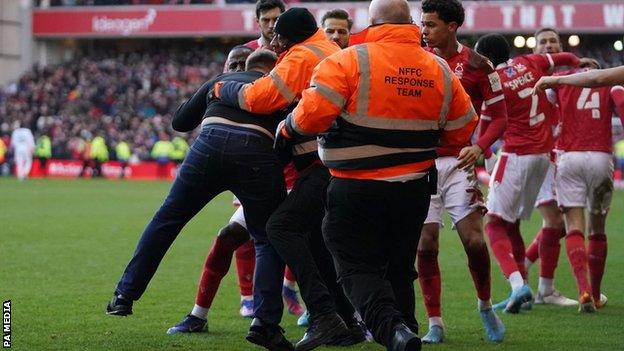Salford City’s League Two clash with Oldham Athletic was briefly halted when two pitch invaders entered the field carrying a flag of St George and a banner reading “Gary Neville is a traitor.” The men, dressed in white hoodies bearing the same slogan, attempted to plant the flag in the centre circle before being swiftly escorted off the pitch by stewards and police.
The disruption occurred in the first half at the Peninsula Stadium and was later claimed by a far-right group that said it was protesting against Neville’s recent decision to remove a union flag from one of his Manchester development sites. The group described the incident as a statement against what they called Neville’s “treachery.”
Neville, who co-owns Salford City, had explained earlier in the week that he removed the flag because it was being misused and associated with negative symbolism. He expressed concern about rising division in the country and called for reflection on what true patriotism means. According to him, symbols such as the Union Jack should represent unity rather than hate.
The former England defender emphasized that his actions were not anti-British but rooted in his belief that nationalism should not be distorted by anger or extremism. Having represented England 85 times during his playing career, Neville insisted that he remains proud of his country, city, and heritage. He urged citizens to resist being drawn into polarized ideologies, saying the nation needed to “check itself” and rediscover a sense of balance and mutual respect.
The incident came a day after a tragic attack at a synagogue in Manchester, which heightened tensions around the use of national symbols and rhetoric in the city. Neville’s comments were seen as a call for calm and unity at a time of social unease.
After the brief interruption, play resumed without further incident, and Salford City went on to claim a 1-0 victory. The episode, however, reignited debate around the role of patriotism in modern Britain, the symbolism of national flags, and how figures like Neville navigate public expectations amid political and cultural divides.

